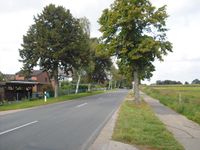Tag:highway=secondary
| Description |
|---|
| A highway linking large towns. In cities, an arterial road of lesser importance. |
| Rendering in OSM Carto |

|
| Group: highways |
| Used on these elements |
| Implies |
|
| Useful combination |
| See also |
| Status: de facto |
| Tools for this tag |
|
Use highway=secondary to tag highways which are not part of major routes, but nevertheless form a link in the national route network. Secondary highways are generally specified by country road classification bylaws and assigned a ref=reference code. In developed countries, it is normally a paved road with at least one lane in each direction, usually separated by a central line. In areas with worse infrastructure road quality may be far worse.
In cities it is usually used to tag major arterial roads, but of lesser importance than primary roads. See the international highway classification equivalence for an overview of highway tagging principles among countries.
How to map
Select all ways which belong to the highway and tag them with highway=secondary. To attach more information for the highway you should add further keys.
- name=name The name of the highway, for example Skipton Road
- maxspeed=number The maximum speed, in kilometers per hour which is allowed on the road, for example 120
- ref=reference code The reference number of the road, for example R 372 or C 452
- loc_name=name The unofficial or local name for a road
- maxweight=number The weight limit in tonnes, for example 5.5
- winter_service=* – if winter service is provided
Special situations
When a highway section runs over a bridge or through a tunnel, split the way from the rest of the road and tag it with one of:
- bridge=yes – if it goes over a street or waterway
- tunnel=yes – if it goes below a street or waterway
Roads with dual carriageways, less commonly classified as secondary, should be mapped as two parallel ways, one for each traffic direction, adding oneway=yes.
Route relations
In OSM, roads are divided into many sections (ways) which differ by tag values such as maxspeed=*, bridge=* or tunnel=*. Those sections should be added to a route relation that identifies them as a single legally defined route with common properties (typically ref=*, operator=*, name=*, from=*, to=*).
| ||||||||||||||||||||||||||||||
